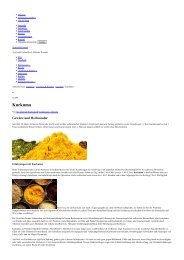Urinary Tract Infections - Zentrum der Gesundheit
Urinary Tract Infections - Zentrum der Gesundheit
Urinary Tract Infections - Zentrum der Gesundheit
You also want an ePaper? Increase the reach of your titles
YUMPU automatically turns print PDFs into web optimized ePapers that Google loves.
cancer.html http://medplant.nmsu.edu/Diseases/uti/uti.HTML<br />
Prevention of UTI’s:<br />
Drink plenty of water every day<br />
Urinate when needed; don’t resist the urge to urinate<br />
Wipe from front to back to prevent bacteria around the anus from entering the vagina<br />
or urethra<br />
Avoid coffee, alcohol, and spicy foods<br />
Avoid smoking<br />
Take showers instead of tub baths<br />
Cleanse genital area before sexual intercourse<br />
Avoid using feminine hygiene sprays and scented douches, which may irritate the<br />
urethra<br />
Some doctors suggest drinking cranberry juice<br />
Medicinal Plants<br />
Herbal actions to help UTI:<br />
<strong>Urinary</strong> support herbs – provide general heating support for the urinary system.<br />
Herbs: agrimony, couchgrass, el<strong>der</strong> flowers, plantain, yarrow, juniper, horsetail,<br />
Lady’s mantle, saw palmetto<br />
Foundation support herbs – provide overall nutritional and adaptogenic support.<br />
Herbs: nettles, red clover, super blue-green algae, astragulus, ginsengs, acidophilus,<br />
burdock<br />
Demulcents – will help soothe and coat irritated inflamed tissue. Herbs:<br />
marshmallow, comfrey, plantain, violet, mullein, corn silk<br />
Antispasmodics – helps body reduce muscular spasms along urinary tract. Herbs:<br />
marshmallow, hops, red raspberry, skullcap, chamomile<br />
Alkalizing herbs – may help alkalize the urine. Herbs: sarsaparilla, peppermint,<br />
marshmallow, comfrey, root, plantain, ginger<br />
Anti-microbials – help overcome and destroy pathogenic bacteria and strengthen<br />
immune responses. Herbs: echinacea, goldenseal, myrrh, burdock, garlic, bilberry,<br />
uva ursi, feverfew, honeysuckle, barberry, buchu<br />
Diuretics – stimulate the kidney and blad<strong>der</strong> and increase the flow of urine. Herbs:<br />
dandelion, corn silk, sassafras, juniper berry, fennel, cleavers, uva ursi, horsetail,<br />
goldenrod, meadowsweet, pipsissewa, plantain, shepherd’s purse<br />
Anti-inflammatory – lessen inflammation caused by bruising or trauma, or from<br />
infection, and lessen pain. Herbs: ginger, Echinacea, yellow dock, licorice, gotu kola,<br />
comfrey, chamomile, marshmallow<br />
For cystitis: beth root, horsetail, hydrangea, corn silk, barberry, black haw<br />
For kidney involvement: gravel root, marshmallow leaf, couchgrass, barberry, stone root,<br />
hydrangea, corn silk, uva ursi<br />
Bacteria specific herbs:<br />
Enterobacter – eucalyptus<br />
Candida – ginger, yarrow, barberry, fennel, black cohosh<br />
E. Coli – yarrow, uva ursi, calendula, fennel, St. John’s wort, chamomile, Oregon<br />
grape root, thyme, ginger<br />
Klebsiella – uva ursi, thyme, St. John’s wort, honeysuckle, ginger<br />
Proteus– – garlic, eucalyptus, thyme, horseradish<br />
Streptococcus faecalis – calendula, blessed thistle, ginkgo, thyme, ginger<br />
Plants used in the treatment of urinary tract infections:<br />
1.) Cranberry: Traditionally, cranberry has been used for many urinary tract aliments.<br />
Preparation of cranberry: the use of encapsulated cranberry extract, several large<br />
glasses of high quality cranberry juice or of a cranberry tincture (cranberry extracted<br />
into an alcohol solution) are recommended. Cranberries contain proanthocyanidins,<br />
which demonstrate an ability to prevent E. coli, the most common cause of bacterial<br />
urinary tract infections, from adhering to the inner walls of the blad<strong>der</strong>.<br />
Photo courtesy of The University of Maine Cooperative Extension<br />
2.) Blueberry: Blueberry has also been used traditionally to treat and prevent urinary<br />
tract infections. Like the cranberry, blueberries demonstrate bioactive compounds<br />
that inhibit the ability of E. coli to adhere to the walls of the blad<strong>der</strong>. Rutgers<br />
University is currently conducting a wide variety of studies on the medicinal values<br />
of blueberries, including its use for urinary tract infections.<br />
Photo courtesy of http://Free-Stock-Photos.com<br />
3.) Bearberry/ Uva ursi: Bearberry preparation: an effusion of bearberry leaves is the<br />
recommended method of use, along with plenty of fruits and vegetables to make the<br />
urine more alkaline. Bearberry leaves contain arbutin, which exhibits an antibacterial<br />
effect in alkaline urine, where arbutin breaks down into glucose and an antibacterial<br />
unbound hydroquione.<br />
3 von 5 16.04.2012 16:41















